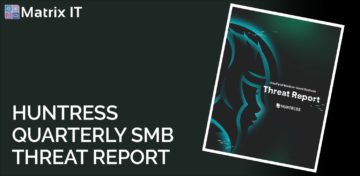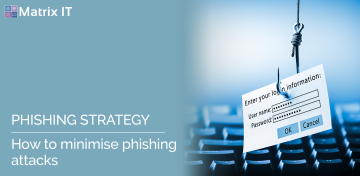IT support in education plays a critical role in enhancing the learning environment, ensuring smooth…
Cyber threats are continually evolving, becoming more sophisticated and harder to detect. As a result,…
Matrix IT has been listed as one of the UK’s top five Managed Service Providers…
Marketing Assistant Ellis Batchelor has won ‘IT Apprentice of the Year’ and ‘Overall Apprentice of the…
From mitigating the risk of data loss to ensuring business continuity in the face of…
In today’s fast-paced digital world, businesses are continually seeking ways to streamline operations and boost…
Matrix IT commits to Armed Forces Covenant in support of military community. Leading Hampshire IT…
In today’s fast-paced digital landscape, crafting a robust IT strategy is imperative for businesses to…
The countdown is on as three-times-nominated Matrix IT gears up for Apprenticeship Awards. With just…
Fully Managed IT Support allows businesses to remove the burden of their day-to-day management of…
Matrix IT has helped to kit out a football team of a British Army Unit,…
The team at Fareham-based Matrix IT put on their most fabulous headwear to raise money…
Portsmouth FC’s Head Coach John Mousinho has delighted employees at a Fareham-based company after paying…
The 2025 PSTN switch off has been delayed to 2027, are you prepared? PSTN (Public…
As businesses and individuals increasingly rely on digital platforms for communication, commerce, and information sharing,…
The dynamic team of women at a Hampshire IT Managed Service Provider are striving to…
Matrix IT are moving – just around the corner! We are excited to share with…
Setting up a secure password is essential to all members of an organisation since just…
Windows 10 will reach its End of Life (EOL) on 14th October 2025. Before Windows…
A leading Hampshire IT Managed Service Provider has strengthened its pledge to address the region’s skills…
Google and Yahoo have declared the implementation of a more rigorous criteria for bulk email…
The Huntress Quarterly SMB Threat Report helps small and medium sized businesses (SMBs) to understand…
Scam emails can be hard to identify, and a lot of people can fall victim…
At Matrix, our clients’ satisfaction is paramount to our business, and we place customer service…
Matrix IT would like to thank everyone who donated and thank everyone who took part…
Congratulations to Ollie, our first line support engineer on closing our millionth service desk ticket…
Matrix IT are thrilled to announce winning, not 1, but 2 awards last night at…
Microsoft Teams is a communication platform that is used by businesses and individuals to work…
What is Phishing? Phishing is when cyber-criminals attempt to trick people into clicking a link…
Movember is the leading charity changing the face of men’s health, and this November the…
Some believe that if they live a normal enough life cyber-crime can’t affect them, but…
‘Backup’ and ‘Disaster Recovery’ are two related but distinct concepts in the field of Data…
Windows Server 2012 will reach its End of Life (EOL) on 10th October 2023. This…
Many believe that it is only Windows computers that require antivirus protection, however, this is…
Matrix IT are delighted to announce the extended partnership with Portsmouth Football Club. The multi-year…
Matrix IT, a leading Hampshire based IT support company has joined forces with Havant Rugby…
Proactive and Reactive IT represent two different approaches to managing and handling IT within an…
Using a Password Manager is an effective strategy to improve your online security, simplify password…
Microsoft Teams and Zoom are two of the most popular collaboration and communication platforms used…
(Photo left to right: Kev Penny, Louise Gascoigne, Matt Faulkner, Steve Carnell) Matt Faulkner, who…









































